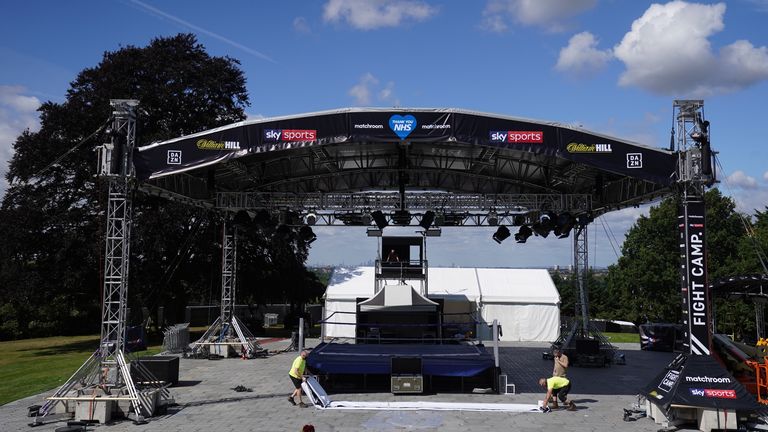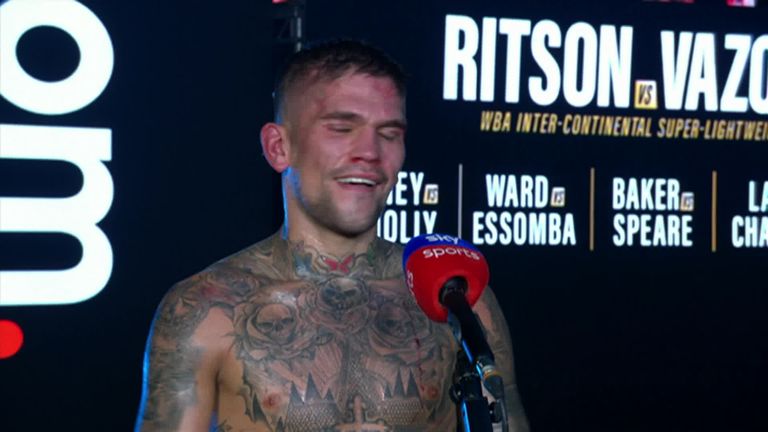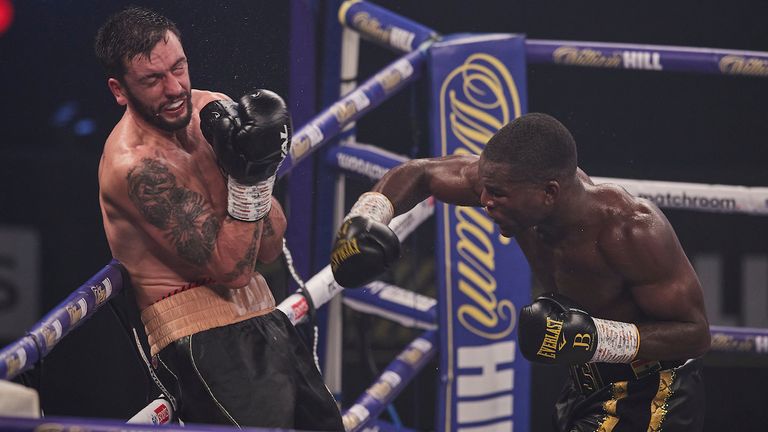Anthony Joshua is returning but Dan Morley reveals how many pro boxers still face a bleak future
Tuesday 20 October 2020 09:58, UK
Anthony Joshua has announced his return, but unbeaten contender Dan Morley reveals how many small hall fighters are still facing an uncertain future.
Unified world champion Joshua is back in action at The O2 in December, while fellow heavyweights such as Derek Chisora and Dillian Whyte are also headlining high-profile shows in the coming weeks as the sport resumes its revival in Britain during the coronavirus pandemic.
But a large crop of boxers remain inactive, with their careers left in limbo as smaller venues are still unable to admit fans, who provide crucial income with ticket sales.
Morley, an unbeaten welterweight, offers insight into his plight as a small hall fighter after being sidelined for a year...
"The highly-anticipated return of televised sport was a huge success, providing a familiar entertainment back to our lives. The drama of live events provides a spectacle that fills us with excitement, joy, and a sense of normality in abnormal times. In their absence, they were sorely missed.
"Unfortunately, venues across the country will be denied crowd atmospheres for the foreseeable future as sports have been forced behind closed doors. The financial repercussions of empty events will dramatically impact the boxing industry. Fortunately for fighters signed under large promotional companies, regular earnings remain attainable, with opportunities arising as income flows through televised fight cards.
"Covid-19 has forced industries to implement immediate change to survive. Boxing's adaptations can continue to supply a living to those who pursue it professionally and increase the quality of televised content. With Covid guidelines restricting content available on television and paralysing the small hall circuit, viewers' demands for high-quality content have been met with competitive bouts on the fewer fight slots available throughout the pandemic.
"Tough matchmaking offers invaluable experience for favoured prospects as well as offering career-changing opportunities for fighters hovering below the radar of a televised fight, ultimately resulting in better viewing for fans. It is a win-win for all involved.
"However, the bigger picture is far from ideal. Fighters signed under established promotional companies maintain a living through the pandemic, while prospects like me and journeymen who earn their livelihood on the small hall circuit face the grim prospect of inactivity over the course of a whole year.
"With current opportunities to fight being restricted to established promoters, televised and online shows, this begs the question, which path must fighters follow to feature on televised fight cards?
"Fighters must attract the attention of promoters searching for future stars. Once an established promoter signs a fighter, they will possess a platform to impress large audiences across the nation. Establishing yourself as a top-tier televised fighter offers life-changing opportunities, lucrative purses, and sponsorship packages all while delivering a clear path towards title shots.
"A successful amateur career is an outstanding way to announce yourself onto the professional scene and catch the eye of eager promoters. Amateur standouts typically sign with established promoters early on in their professional career and climb the rankings under the bright lights of televised shows from the beginning. This extreme exposure provides high-level pressure before boxers have gained enough experience to mature into seasoned professionals. However, highly-touted prospects are carefully managed by their invested backers, progressing meticulously with the intention of capturing titles, all while reaping the benefits associated with television exposure.
"Although this path seems destined for success, talented amateurs can struggle to adapt to professional boxing, despite having a careful plan set out. The styles between amateur and professional boxing are entirely different propositions. A successful amateur will not always fare well amid the slower, more punishing style of professional boxing.
"On the other hand, successful professionals have struggled with the faster paced-point scoring style of amateur boxing, opting to turn professional with a style suited better to longer, more gruelling rounds. A mediocre amateur record will fail to alert promoters of your talents when turning professional, preventing significant financial support, and forcing modest amateurs to progress through the unglamorous small hall shows.
"This journey requires resilience and offers minimal income. Small hall shows are funded and supported by ticket sales. The responsibility of drawing crowds relies solely on boxers who promote and sell their own tickets, paying expenses between £2,000-£3,000 to opponents and venues before collecting moderate earnings. Earnings beyond this figure are split between promoters, coaches, and cuts-men before fighters collect their cut. Expenses must be covered from fighters' own pockets if enough tickets are not sold.
"The grassroots level of small halls lacks the exposure and income that televised fighters benefit from. On the other hand, it provides gritty challenges and invaluable experience against seasoned journeymen, giving prospects the freedom to learn the trade without the pressure of a global audience.
"With perseverance, talented small hall boxers can earn a chance to fight on televised cards by beating everybody in their way. Winning a local area title can launch them into bouts against established televised fighters signed by big promoters. Success in these fights lead to more frequent televised appearances and potential promotional backing. It is a gruelling method that requires persistence and determination. The financial struggles of small hall boxing present a tougher battle than any opponent and have pummelled many prospects to an early retirement.
"There are many popular prospects performing on small hall shows, drawing hundreds of avid friends, family members and fans to each fight. The goal for promoters is to fill arenas and selling a high quantity of tickets consistently, may speed up a popular prospect's progress to the glitz and glamour of televised fight cards, with promoters eager to benefit from large fan bases providing an atmosphere on their shows.
"Talent is key, but professional boxing is the entertainment business. A handful of boxing's most accomplished world champions were criticised and denied televised exposure for lacking character or failing to provide entertainment in the ring, whereas mediocre fighters have gained consistent televised slots solely due to their ability to draw in viewers.
"Personally, I currently find myself in a tough spot regarding my professional boxing career. My biggest fight to date was snatched from me due to lockdown in March. A promising year of development begun with a headlining bout at the famous York Hall, over eight rounds for an eliminator for the welterweight Southern Area title.
"A win assured me of big fights in the future, and ticket sales were set to be a personal bestseller, as family and friends' investment in my career has grown rapidly over six professional fights spanning two years.
"Covid-19 dealt me a blow which saw a promising year quickly develop into 12 months of inactivity. In my case as I hover below the attention of mainstream promoters, all I can do is stay prepared at the Boxing Booth gym, continuing to spar top talents such as Josh Kelly, Abass Baraou, Harlem Eubank and Germaine Brown. Hoping for a big opportunity to present itself, while the prospect of further inactivity looms larger."







